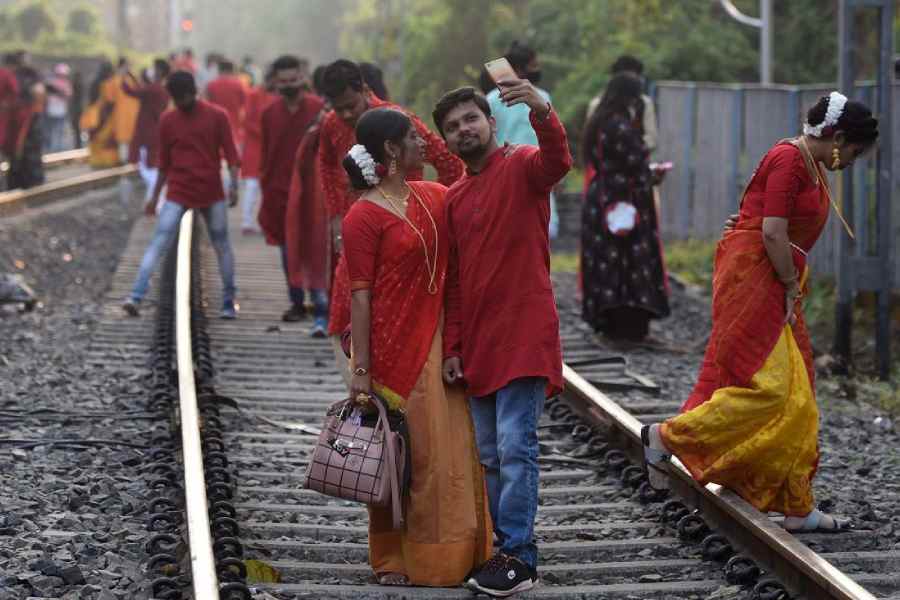Divine comedy
Sir — Love may be in the air this Valentine’s week but couples in Bengal are sulking. The reason for their melancholy is not hard to seek: this year Valentine’s Day coincides with Saraswati Puja, which is often called the Bengali Valentine’s Day. Young people in love looking to spend time together on Valentine’s Day usually face parental opposition and are advised to focus on their studies instead. But on Saraswati Puja, with books and copies dutifully placed at the deity’s feet, couples find such obstacles melting away as they step out hand in hand under the guise of pandal hopping with friends. However, this year’s coincidence of the two dates has unfortunately left parents vigilant and couples wary about the day.
Shreya Basu, Calcutta
Black vs White
Sir — The Black Paper presented by the Congress against the Narendra Modi government and the White Paper released by the Bharatiya Janata Party against the erstwhile United Progressive Alliance government were both unnecessary. The UPA was afflicted by corruption and, later, the Congress failed to act as a credible Opposition. The BJP, on the other hand, has stumbled on many fronts like creating employment opportunities and improving the economy. Modi is the BJP’s only trump card.
Sravana Ramachandran, Chennai
Sir — The Black Paper and the White Paper presented in Parliament by the BJP and the Congress, respectively, show how little space contemporary politics has for contrary opinions. This is unfortunate for India has had a glorious tradition of including divergent views. The cabinet formed by the country’s first prime minister, Jawaharlal Nehru, not only had members from various sections of society but also made space for Nehru’s detractors. The Congress had absolute hegemony then but it still allowed other political ideas fertile ground to put down roots. Dissent preceded decision-making.
R. Narayanan, Navi Mumbai
Biased approach
Sir — Over the last decade, there has been a systematic attempt to chip away at the core principles of fiscal federalism and weaken the states (“Funds calls linked to separatism”, Feb 8). No wonder some southern states have hit the streets to demand their rightful dues. Legislators from Karnataka and Kerala, including the chief ministers, Siddaramaiah and Pinarayi Vijayan, recently staged sit-ins at the Jantar Mantar in Delhi to protest against the Centre’s biased fiscal policies. Tamil Nadu and Punjab, too, have lent their support to this movement.
The timing of the protest is significant as the 16th Finance Commission has just begun its deliberations. Despite the 15th Finance Commission’s recommendation of devolving 41% of Central taxes to the states, the latter receive only about 30% as the Centre increasingly relies on cesses and surcharges that do not need to be shared with the states. The 16th Finance Commission must objectively determine tax devolution criteria with the aim of reducing inter-state disparities.
Khokan Das, Calcutta
Sir — From the beginning of its tenure, the present dispensation at the Centre has been insistent that voters elect the same party at the Centre as well as in the states. Purportedly, this will allow people to reap the benefits of a ‘double-engine sarkar’. From this claim, it is clear that the Bharatiya Janata Party government intends to dole out stepmotherly treatment to the states where it is not in power. The recent protests by various states against the Centre’s fiscal bias are thus justified.
Jang Bahadur Singh, Jamshedpur
Sir — The alleged non-payment of tax dues to the states by the Centre has snowballed into a major controversy. Much like R.K. Laxman’s iconic Common Man, I wonder which side’s accusations I should believe. There should be more transparency on how public money is being used and who is using it.
Avinash Godboley, Dewas, Madhya Pradesh
True pioneer
Sir — Out of sight but never out of mind, the former prime minister, Manmohan Singh, has retired from the Rajya Sabha after 33 years (“Parliament farewell to Manmohan”, Feb 9). He will always be remembered as a mature politician, thinker and legislator. No praise is enough for the man who reshaped India’s economy.
Murtaza Ahmad, Calcutta
Sir — It is with a heavy heart that Indians bid farewell to one of India’s finest economists and former prime minister, Manmohan Singh. Singh not only ushered in liberalisation, which will remain his foremost contribution to India, but was also the architect of the Mahatma Gandhi National Rural Employment Guarantee Act, the Right to Education Act and the Right to Information Act, among many other rights-based laws. His contributions to India are laudable.
Asim Boral, Calcutta
Sir — Manmohan Singh bid farewell to the Rajya Sabha after 33 years in the House. He is known by one and all for his honesty. The prime minister, Narendra Modi, lauded his predecessor for the latter’s democratic credentials and an exemplary stint as a parliamentarian, while the Union finance minister, Nirmala Sitharaman, tabled a White Paper which blamed Singh’s government for a mountain of bad loans and double-digit inflation. The timing of the White Paper was most unfortunate and detracted from Singh’s many contributions to India.
Sukhendu Bhattacharjee, Hooghly
Sir — It is hypocritical that Narendra Modi hailed his predecessor, Manmohan Singh, as a “shining example” of what a parliamentarian should be when he himself has called Singh a variety of names such as ‘Maun Mohan Singh’ before.
Zakir Hussain, Kazipet, Telangana










